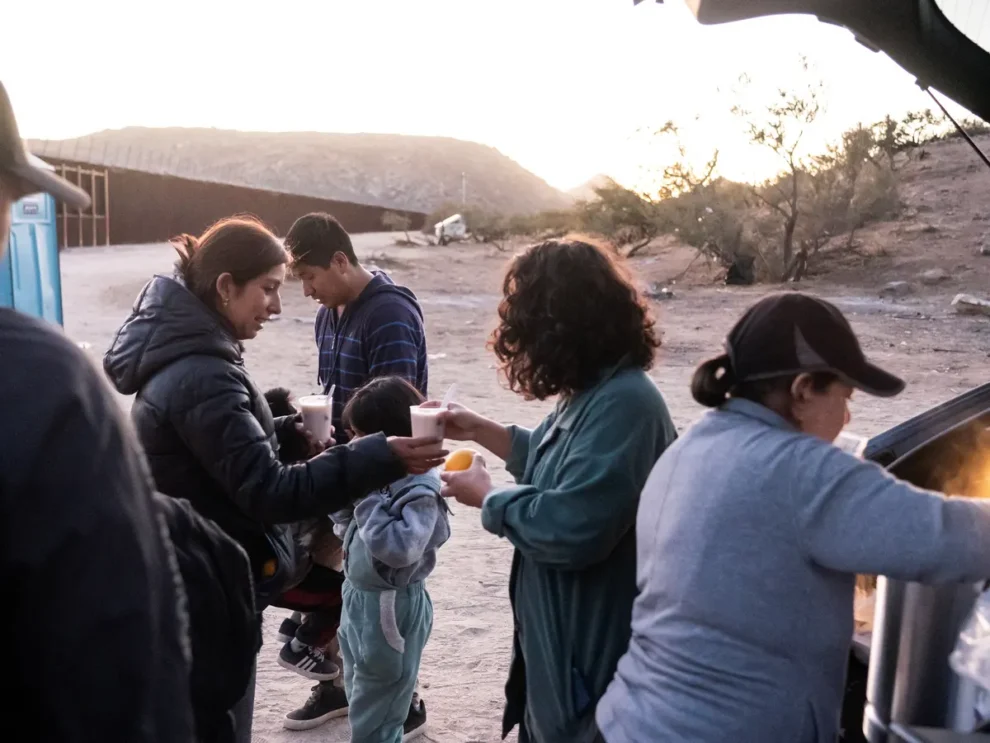It’s 8am on a chilly fall morning when the U-Haul pulls up at the US-Mexico border wall in Jacumba Hot Springs, California. Dozens of people emerge from makeshift tents and from around small bonfires to welcome it, and line up for some of the water bottles and peanut butter jelly sandwiches its volunteers are carrying.
More than 200 people are camped out on this site in the shadow of the border wall, one of three in the desert east of San Diego. Immigrant advocates call the encampments open-air detention centers, or OADs. Most of its residents have crossed through gaps in the wall and then sought out federal authorities to request asylum. US border patrol directed them to the sites to await processing, they say.
Yazmín Calderon, 40, an asylum seeker from Colombia who says she’s fleeing intrafamily violence and threats from criminal groups, said she had been detained by US authorities four days ago. Border patrol gave her a wristband that notes the day she arrived, she said, ostensibly to help process migrants in the order they came across the border. But she was unsure what would happen to her next, and when.
Guards didn’t respond when she went to ask them questions, she said. “They look at you with, like, rage, disgust, contempt. So we’re adrift here because you don’t know who to ask.”
After the long journey north, the conditions in the desert were hard to endure, she said. The worst is the cold at night, she thought. In mid-November in the high desert, nighttime temperatures can drop to 30 degrees, and it recently rained. “Among ourselves, we huddle together, we bundle up, we figure out a way to stay warm because the night is difficult.” She said water bottles freeze overnight.
Border patrol is claiming the people at these sites are not in detention, said Jacqueline Arellano, the director of US programs for Border Kindness, a non-profit migrant relief organization. “However, if you issued somebody a bracelet, and given them the parameters of where to be, and aren’t giving them various instructions starting from the time they cross, and they know that they have to cooperate with border patrol in order to be compliant with the asylum process that they have a legal right to, then how is that not being detained?”, she asked.
No US government agencies are taking care of the migrants in open-air detention, said Arellano, with aid instead being left to volunteer organizations like hers. Border Kindness volunteers usually hike into the deserts and mountains along the US-Mexico border to drop off water and supplies for migrants. Now they’re also helping with the daily assistance for migrants at the OADs in Jacumba Hot Springs.
Migrants usually stay in the camps a handful of days until authorities take them to another facility to process their claims for asylum. Border patrol sometimes asks the volunteers to bring specific items for migrants in need, she said. “We have received pushback for this work in some way from authorities in the past, and now they rely on it.”
Customs and Border Protection responded with a statement after publication that said the agency is “leveraging all available resources and partnerships to efficiently vet and process migrants consistent with law”.
“The agency continues to surge personnel, transportation, processing, and humanitarian resources to the most active and arduous areas throughout San Diego’s border region where migrants are callously placed by for-profit smuggling organizations, often without proper preparation.”
‘It’s a mess’
As volunteers made the rounds to check on folks, 30 more migrants arrived on foot. They were wearing backpacks, and appeared dusty and tired. A border patrol van drove by without stopping.
Among the volunteers at Jacumba Hot Springs is a woman some migrants call “Aunt Bunny”, and whom the Guardian is not identifying to protect her identity.
Born and raised in the desert region, she said it was a part of their culture growing up to learn basic paramedic skills, like how to treat rattlesnake bites and put out fires. And for over a month, Aunt Bunny has been leading the medical response at the open-air detention sites. She visits them multiple times a day: triaging new arrivals, monitoring people with chronic conditions, and treating injuries – all with donated supplies loaded onto the back of her SUV. She calls the situation chaotic.
“If our government’s going to allow this to happen, and they are, they need to deal with it in a more appropriate fashion. One bottle of water a day and one granola bar – that’s what CBP is giving the people – doesn’t have a high enough caloric intake,” she said. Dehydration is a big problem that the cold at night only exacerbates. People with diabetes, high blood pressure and other conditions cannot manage them properly in the makeshift camps, and some have lost their insulin, inhalers, and other medication while coming over the border. She also tends to the wounds people incurred during the trek north, especially from their journeys through the Darién Gap, the treacherous jungle in Panama. “The trauma wounds from the Darién become infected and start bursting,” she said. “It’s a mess. It’s a mess.”
‘We feel proud of the work we do’
The journey from South America to the US has long been treacherous, but the climate crisis is making it more dangerous all along the way.
With temperatures in the southern US soaring to record highs, volunteers who tend to migrants in the desert are working around the clock to fill ever-greater needs. From October 2021 to September 2022, at least 853 people died crossing the US-Mexico border illegally, according to internal border patrol data obtained by CBS – a record high. The number is an undercount, as it only consists of bodies that have been recovered.
Volunteers from search-and-rescue group Armadillos (Ni Un Migrante Menos) hike into the California and Arizona desert to look for remains every weekend.
“It really is a dangerous job,” said Cesar Ortigoza, the group’s co-founder. “We have to freeze the water we take, because when we go into the desert really early in the morning, two or three hours later, the water’s already hot.”
When volunteers find a body, often a skeleton surrounded by personal belongings, they post photos to social media to see if family members can identify it. One year, Ortigoza said, a missing person’s wife identified the bracelet on the remains they found in the desert. He was one of four cousins that had trekked north from Mexico; Armadillos eventually found two of their bodies in the desert.
The Armadillos then alert the border patrol of the exact coordinates of the remains, so they can gather them and perform the proper forensic tests. Finally, they connect the families to their consulates, who work with the US government to repatriate their loved ones’ bodies. “We’re the only hope our brothers and sisters have to get their loved ones back home,” said Ortigoza. “When we help return the body to their family, we also feel an inner peace and feel proud of the work we do.”
‘Someone’s going to die’
Groups like Border Kindness and Armadillos argue that they’re doing work that should be up to the government. In the White House’s spending proposal released last month, Joe Biden included funding for border security to increase the number of people working on asylum cases and add more border patrol agents. Ortigoza, Arellano – they all have day jobs, and work on migrant aid in the early mornings and weekends. Aunt Bunny and other local volunteers are retirees.
Arellano of Border Kindness said resources of mutual aid groups and local volunteers are running out. “Programs that were already providing life-sustaining support along the border are now involved in providing life-sustaining support in OADs. We’re so incredibly strained, and someone’s going to die.”
It’s unsustainable, she said, both in the short- and long-term. “I don’t think that there is an awareness necessarily from the general public, possibly even the folks themselves, that climate is a direct aspect of what is fueling global migration, but it definitely is. And it’s making relief work so incredibly difficult. The need to provide supplies has been greater than ever. Deaths have been greater than ever. We have to replenish supplies faster.”
“The part that aggravates me the most, I think, is that this is unnecessary,” said Aunt Bunny. “I’ve heard border agents say that migrants will tell their friends what it’s like here, and that it will convince their friends not to come. Their friends are coming anyway. You know, my grandmother wanted to come to America from Ireland and she did. And if she hadn’t, my grandchildren would not exist.”
Calderon, the asylum seeker from Colombia, is frustrated waiting in the harsh desert conditions. But she’s at the last stage in a long, difficult journey, so she also feels hopeful. “It’s satisfying to think you can achieve your goals because that’s what’s most important – is to protect our lives. To succeed in getting asylum, begin making money, and see if we can help protect our families’ lives.”
More than supplies, she wants the ability to process her asylum claim and get to work. “If you ask me what I need right now, it isn’t food or blankets. It’s that they take us out of here.”
Source: The Guardian
















